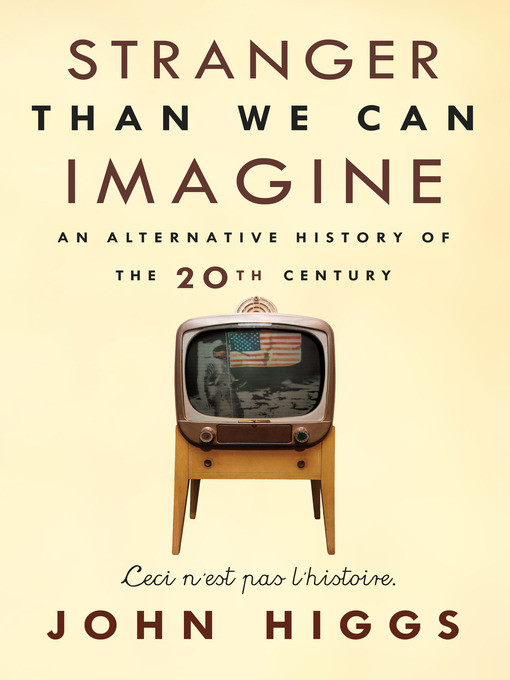“An always-provocative view of an era that many people would just as soon forget . . . an absorbing tour of the 20th century.” —Kirkus Reviews
In Stranger Than We Can Imagine, John Higgs argues that before 1900, history seemed to make sense. We can understand innovations like electricity, agriculture, and democracy. The twentieth century, in contrast, gave us relativity, cubism, quantum mechanics, the id, existentialism, Stalin, psychedelics, chaos mathematics, climate change and postmodernism.
In order to understand such a disorienting barrage of unfamiliar and knotty ideas, Higgs shows us, we need to shift the framework of our interpretation and view these concepts within the context of a new kind of historical narrative. Instead of looking at it as another step forward in a stable path, we need to look at the twentieth century as a chaotic seismic shift, upending all linear narratives.
Higgs invites us along as he journeys across a century “about which we know too much” in order to grant us a new perspective on it. He brings a refreshingly non-academic, eclectic and infectiously energetic approach to his subjects as well as a unique ability to explain how complex ideas connect and intersect—whether he’s discussing Einstein’s theories of relativity, the Beat poets' interest in Eastern thought or the bright spots and pitfalls of the American Dream.
-
Creators
-
Publisher
-
Release date
November 1, 2015 -
Formats
-
Kindle Book
-
OverDrive Read
- ISBN: 9781619026803
- File size: 7507 KB
-
EPUB ebook
- ISBN: 9781619026803
- File size: 7507 KB
-
-
Languages
- English
-
Reviews
-
Publisher's Weekly
November 16, 2015
Marshaling an impressive array of subjects into a brisk and surprisingly cohesive cultural history of the "dark woods" of the 20th century, Higgs (KLF: Chaos, Magic, and the Band Who Burned a Million Pounds) explains what happened after the world lost its "omphalos"âthe ancient concept of the center of the universe. The 20th century's early milestones smashed many of the traditional frames of reference humans had: Einstein's theory of relativity demonstrated that time was not absolute, the decline of monarchies and the rise of democracy ended an age of absolute authority, and artistic Modernism embraced the limitations of relativist perspective and the freedom of nontraditional narrative. What arose, for better or worse, was a cult of the individual that began with occultist Aleister Crowley's imperative to "do what thou wilt," and eventually gave birth to totalitarianism and youth culture alike. Higgs affects a witty and casual tone, but his indictment of individualism, which he sees as a path to vapidness, nihilism, and commercialism, is rather severe. He does, however, find hope at the dawn of the 21st century, the age of the network, when multiple-model atheism and the Internet's quest for transparency can perhaps lead humanity out of the wreckage of the 20th century. -
Kirkus
September 1, 2015
British quiz-show scripter Higgs (The KLF: Chaos, Magic and the Band Who Burned a Million Pounds, 2013, etc.) offers an idiosyncratic, always-provocative view of an era that many people would just as soon forget. Yes, one plus one equals two. But how do we know? In part, it's thanks to Bertrand Russell, who, on the evening that the 19th century turned into the 20th, scratched out a theorem "to prove beyond argument that 1 + 1 = 2 was not an arbitrary assertion, but a fundamental truth." It didn't quite work out, but within months, Albert Einstein would be reshaping mathematics, Sigmund Freud would be rewriting the rules of the mind, and the old verities would be overturned and overthrown one by one. The 20th century was a time of destruction, creative and otherwise; not for nothing does Higgs use a statement from Keith Richards as the tag line for his book: "We needed to do what we wanted to do." From that declaration of independence, the author sketches out storylines that embrace art, culture, and commerce over a period that feeds directly into our own-and our own is strange enough, with respect to his title, as he observes when he notes that a recent brush with war in North Korea involved not just states, but also corporations, and foremost among them an entertainment corporation at that. "Strange," in Higgs' vocabulary, includes the domains of deviance and oddness but also a randomness that may not be entirely random. As he notes early on, the anarchist who inspired Joseph Conrad's novel The Secret Agent may have had a perfectly rational reason for choosing a seemingly irrational target. While there is very little in this book that literate readers won't have encountered elsewhere, Higgs crafts of disparate facts and anecdotes a story all his own. Full of unexpected linkages and brightly written, this is an absorbing tour of the 20th century.COPYRIGHT(2015) Kirkus Reviews, ALL RIGHTS RESERVED.
-
Loading
Why is availability limited?
×Availability can change throughout the month based on the library's budget. You can still place a hold on the title, and your hold will be automatically filled as soon as the title is available again.
The Kindle Book format for this title is not supported on:
×Read-along ebook
×The OverDrive Read format of this ebook has professional narration that plays while you read in your browser. Learn more here.


